 Paul Charles Pratt (November 1, 1889 to July 7, 1948) | |
 Compositions Compositions | |
|
1909
Vanity: Rag Two-Step1910
Walhalla: Two-Step RagColonial Glide 1911
Moontime is Spoontime (When You're With theGirl You Love) I Want a Real Lovin' Man [1] That Ever Lovin' Bearcat Prance 1912
Teasing RagThe Tickler [2] Remembrance [3] Just an Old Time Song [4] That Gosh Ding Hiram Tune [4] 1913
As the Day Fades Away I Want You [4]When I Hear the Songs of Dixie Land [4] Gasoline [4] Who Shall Wear Them, You or I, Love? [4] I'm Going Back to Birmingham [4] Only Because It's You [4] Just Because I Love You, Dearie, Best of All [4] My Old Girl [4] When the Two Lips Lip and the Cow Slips Slip and the Daisies Have Their Day [4] 'Mid the Purple Tinted Hills of Tennessee [4] You Can't Repay the Debt You Owe Your Mother [4] 1914
Everybody TangoHot House Rag My Rose of Old Kentucky [5] In the Land of Apple Blossoms, Arkansas [6] 1915
Spring-Time RagWhen the Moon Shines Down on Lonesome Town Who'll Be Your Sweetheart Then? [4] As the Day Fades Away I Want You [4] Twilight Brings Dreams of You [4] The Shepherd of the Hills [6] |
1916
A Little Bit of Rag (A Hawaiian Drag)Dreamy Days of Long Ago [4] Wailana Rag [7] Prattles [7] Foxie Feet [7] 1917
On the Rural Route: Fox Trot RagWhy Don't You Try to Love Me? 1918
Kissable Child [4]Your Daddy Will Be Proud of You [4] Sweet Cookie [7] 1919
Sur le Lac Champlain: Barcarolle (Op. 15)Our Moon Man [8] 1920
Temptation [9]Extravagance [9,10,11] 1921
So This is Paris: Vaudeville Music [9]Sultana: Fox Trot [9] Honey I Will Wait for You [9] Six Little Playmates [9] Siren of the Nile [9,12] My Melodies [9,12] Unknown Year or Unpublished
Enchantment Rag [2]The Aeroplane Rag [2] Fluff - A Rag [2] Bones - A Rag [2]
1. w/May Aufderheide
2. Unpublished 3. w/D.W. Laurie 4. w/J. Will Callahan 5. w/J.A. Pederson 6. w/J. Harvey Burgess 7. Piano Roll Only 8. w/George Clarence Anderson 9. as Paul Parnell 10. w/Sidney F. Lazarus 11. w/Armand Kaliz 12. w/Raymond Midgley |
 Selected Rollography Selected Rollography | |
|
Prattles
On the Rural Route A Little Bit of Rag (A Hawaiian Drag) My Flower Garden Girl Someone Else May Be There While I'm Gone Cleopatra Had a Jazz Band Ragging the Uke: A Honolulu Rag Dreamy Days of Long Ago Kissable Child [1] Foxie Feet [1] Caterpillar Creep [1] There's Egypt in Your Dreamy Eyes [1] Cherry Blossom [1] Poor Butterfly [1] Where the Morning Glories Grow [1] In the Land of the Wedding Bells [2] Long Boy [2] Indianola (Indian Novelty) [2] My Flower of Italy
1. Played by Mary E. Brown and Paul Pratt
2. Played by Pratt and Winters |
[U.S. Music 7916] 1916
[U.S. Music 7952] 1916 [U.S. Music 8005] 1916 [U.S. Music] 1917 [U.S. Music] 1917 [U.S. Music] 1917 [U.S. Music] 1917 [U.S. Music] 1917 [U.S. Music] 1917 [U.S. Music 8551] 1917 [U.S. Music] 1917 [U.S. Music] 1917 [U.S. Music] 1917 [U.S. Music] 1917 [U.S. Music] 1917 [U.S. Music] 1917 [U.S. Music] 1917 [U.S. Music 28612] 1917 [U.S. Music] 1918 |
Paul Pratt was part of the Indianapolis group of young composer friends who contributed just a few but still significant pieces into the ragtime collective. He was born in New Salem, Rush County, Indiana (not in Salem, which is in a different part of the state),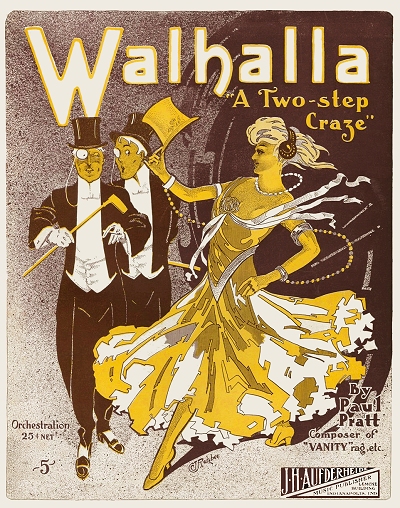 to grocer and Kentucky native James Garthan Pratt and his Indiana born wife Kate D. Johnson, the oldest of three children including brother Carl (6/1892), and sister Mildred (1906) who came along when Paul was sixteen. Some sources cite 1890 as the year of birth, but a birth record, two different draft records and the 1900 enumeration point to 1889. The Pratt family lived in Colorado for a few years in the early to mid-1890s before moving back to Indiana later in the decade. As of the 1900 census the family was shown living in Indianapolis, Indiana at 2018 Highland Place. Paul received the normal musical training often given to young people of the time, but his natural musical abilities took him beyond many of his peers in terms of both knowledge and desire. In his teens he also learned harmony and theory, which helped him to transcribe and arrange music, and ultimately get his break.
to grocer and Kentucky native James Garthan Pratt and his Indiana born wife Kate D. Johnson, the oldest of three children including brother Carl (6/1892), and sister Mildred (1906) who came along when Paul was sixteen. Some sources cite 1890 as the year of birth, but a birth record, two different draft records and the 1900 enumeration point to 1889. The Pratt family lived in Colorado for a few years in the early to mid-1890s before moving back to Indiana later in the decade. As of the 1900 census the family was shown living in Indianapolis, Indiana at 2018 Highland Place. Paul received the normal musical training often given to young people of the time, but his natural musical abilities took him beyond many of his peers in terms of both knowledge and desire. In his teens he also learned harmony and theory, which helped him to transcribe and arrange music, and ultimately get his break.
 to grocer and Kentucky native James Garthan Pratt and his Indiana born wife Kate D. Johnson, the oldest of three children including brother Carl (6/1892), and sister Mildred (1906) who came along when Paul was sixteen. Some sources cite 1890 as the year of birth, but a birth record, two different draft records and the 1900 enumeration point to 1889. The Pratt family lived in Colorado for a few years in the early to mid-1890s before moving back to Indiana later in the decade. As of the 1900 census the family was shown living in Indianapolis, Indiana at 2018 Highland Place. Paul received the normal musical training often given to young people of the time, but his natural musical abilities took him beyond many of his peers in terms of both knowledge and desire. In his teens he also learned harmony and theory, which helped him to transcribe and arrange music, and ultimately get his break.
to grocer and Kentucky native James Garthan Pratt and his Indiana born wife Kate D. Johnson, the oldest of three children including brother Carl (6/1892), and sister Mildred (1906) who came along when Paul was sixteen. Some sources cite 1890 as the year of birth, but a birth record, two different draft records and the 1900 enumeration point to 1889. The Pratt family lived in Colorado for a few years in the early to mid-1890s before moving back to Indiana later in the decade. As of the 1900 census the family was shown living in Indianapolis, Indiana at 2018 Highland Place. Paul received the normal musical training often given to young people of the time, but his natural musical abilities took him beyond many of his peers in terms of both knowledge and desire. In his teens he also learned harmony and theory, which helped him to transcribe and arrange music, and ultimately get his break.This break came in 1908 when his friend Cecil Duane Crabb, an artist and friend of composer May Aufderheide, had Paul arrange her Dusty Rag for independent publication by Crabb, while all were still in their teens. Because of May's determination to have her work in print, her father, John Henry Aufderheide, admired the efforts of the trio to the point where he started J.H. Aufderheide & Company just to publish their works. Paul may have worked with Crabb in an artistic capacity as well, since the 1907 to 1909 Indianapolis city directories showed him as a young draftsman.
Although Cecil was retained by Aufderheide for creating cover art work, he also published a couple of pieces with the firm, ultimately turning to art and sign painting as his profession. Paul, barely 20, was hired as the manager and arranger for the Aufderheide company, as shown in the 1910 Indianapolis city directory and that year's census, which also showed him as still living with his family. James was now working as a machinist.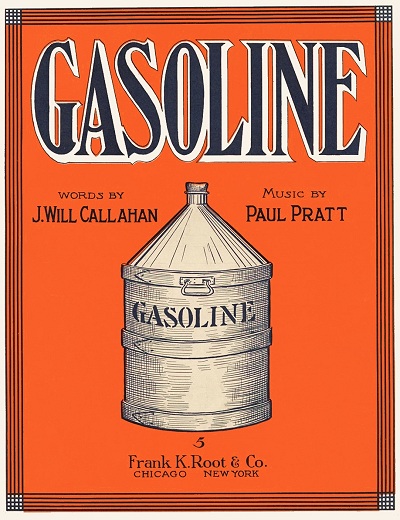 One of Paul's first rags for the Aufderheide firm was Colonial Glide featuring a highly innovative trio with an enchanting chord progression. He later recalled that even though there has been no historical confirmation of contracts for those published by Aufderheide, he received a 1.5 cent per copy royalty for this piece. The success of the firm from publicity, as well as additional composers in the stable like Will Morrison, Gladys Yelvington, Abe Olman and Julia Lee Niebergall, allowed J.H. Aufderheide to expand his enterprise with a second location in a better distribution hub, Chicago. He sent Pratt there to manage the new branch, with Niebergall taking over some of the arranging duties in Indianapolis.
One of Paul's first rags for the Aufderheide firm was Colonial Glide featuring a highly innovative trio with an enchanting chord progression. He later recalled that even though there has been no historical confirmation of contracts for those published by Aufderheide, he received a 1.5 cent per copy royalty for this piece. The success of the firm from publicity, as well as additional composers in the stable like Will Morrison, Gladys Yelvington, Abe Olman and Julia Lee Niebergall, allowed J.H. Aufderheide to expand his enterprise with a second location in a better distribution hub, Chicago. He sent Pratt there to manage the new branch, with Niebergall taking over some of the arranging duties in Indianapolis.
 One of Paul's first rags for the Aufderheide firm was Colonial Glide featuring a highly innovative trio with an enchanting chord progression. He later recalled that even though there has been no historical confirmation of contracts for those published by Aufderheide, he received a 1.5 cent per copy royalty for this piece. The success of the firm from publicity, as well as additional composers in the stable like Will Morrison, Gladys Yelvington, Abe Olman and Julia Lee Niebergall, allowed J.H. Aufderheide to expand his enterprise with a second location in a better distribution hub, Chicago. He sent Pratt there to manage the new branch, with Niebergall taking over some of the arranging duties in Indianapolis.
One of Paul's first rags for the Aufderheide firm was Colonial Glide featuring a highly innovative trio with an enchanting chord progression. He later recalled that even though there has been no historical confirmation of contracts for those published by Aufderheide, he received a 1.5 cent per copy royalty for this piece. The success of the firm from publicity, as well as additional composers in the stable like Will Morrison, Gladys Yelvington, Abe Olman and Julia Lee Niebergall, allowed J.H. Aufderheide to expand his enterprise with a second location in a better distribution hub, Chicago. He sent Pratt there to manage the new branch, with Niebergall taking over some of the arranging duties in Indianapolis.Unfortunately for all involved in the expanding company, fortunes quickly dried up. May lost her desire to continue on track with her well-crafted rags, and with sales suddenly slowing, her father also lost interest in continuing the company. His sale of the J.H. Aufderheide catalog to the Mentel Brothers in Cincinnati left the 21 year-old Pratt in Chicago without a job. He had also recently married to Adelia Deschamps on November 12, 1911, but that union would be short-lived. In desparation to both seek good work and continue to compose and arrange, Paul went to New York City where he contracted with some of the firms in Tin Pan Alley.
While working with another Indianapolis friend, J. Will Callahan, Pratt had some success with a few novelty songs. One of their selections that still rings true a century later extolled the necessary evils and fiscal non-virtues of Gasoline. His musical skills brought him back to Chicago after a year or so, where he supplemented his musical arranging and playing income by arranging piano rolls for the U.S. Music Company. Pratt was at one point connected with singer Beatrice Harcourt, who in turn had been associated with the Aufderheide company. However, in 1913 he married Mary Marguerite Williams in Chicago.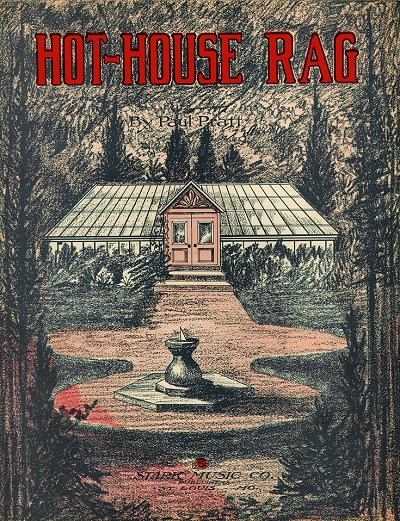 The couple visited Indianapolis for the holiday season in late 1913, as noted in the Indianapolis Star. Paul started dividing his time between the two cities the following year. He and Callahan made the Star again with a story on their song As the Day Fades Away I Want You. "The song, which is tuneful and of fine tempo, is being sung in public for the first time at the Orpheum Theater this week by Bob Sherwood and a trio."
The couple visited Indianapolis for the holiday season in late 1913, as noted in the Indianapolis Star. Paul started dividing his time between the two cities the following year. He and Callahan made the Star again with a story on their song As the Day Fades Away I Want You. "The song, which is tuneful and of fine tempo, is being sung in public for the first time at the Orpheum Theater this week by Bob Sherwood and a trio."
 The couple visited Indianapolis for the holiday season in late 1913, as noted in the Indianapolis Star. Paul started dividing his time between the two cities the following year. He and Callahan made the Star again with a story on their song As the Day Fades Away I Want You. "The song, which is tuneful and of fine tempo, is being sung in public for the first time at the Orpheum Theater this week by Bob Sherwood and a trio."
The couple visited Indianapolis for the holiday season in late 1913, as noted in the Indianapolis Star. Paul started dividing his time between the two cities the following year. He and Callahan made the Star again with a story on their song As the Day Fades Away I Want You. "The song, which is tuneful and of fine tempo, is being sung in public for the first time at the Orpheum Theater this week by Bob Sherwood and a trio."Pratt's 1917 draft card shows him once again in Chicago working for the Jerome H. Remick company, likely as an arranger and/or demonstrator. Still, some of his rags from the 1910s, including the clever Spring-Time Rag and iconic Hot House Rag, were published by John Stark who had left New York by this time but was still working out of St. Louis. Others were published as piano rolls only and never saw printing on paper. A large number of popular pieces were arranged by Pratt for U.S. Music, many of them uncredited, including some of his own works. A series of rolls from 1917 were "hand-played" by "Brown and Pratt" or "Pratt and Winters," including Yock-a-Hilo Town, Indianola and Pratt's own Kissable Child and Foxie Feet. Paul lost his second wife, Mary, as a result of the Spanish Flu pandemic on December 17, 1918.
Pratt's inherent musicality and arranging talents again led him to New York City in the late 1910s by way of vaudeville. He was seen in an advertisement for The Palace, the pinnacle of vaudeville house, in Manhattan in July, 1919.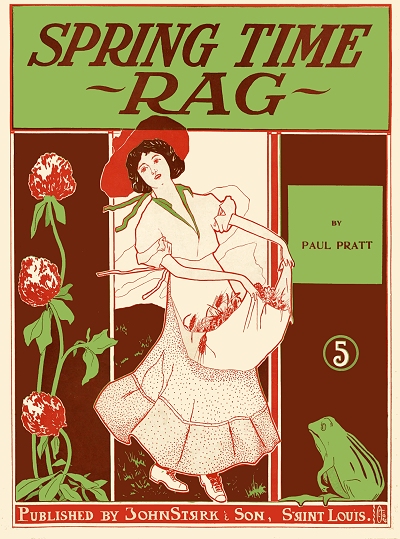 However, he was now using the stage name Paul Parnell, which was taken from Louise Parnell his late wife's mother's maiden name. "Lucille Cavanagh, assisted by Wheeler Wadsworth, Mel Craig, and William H. Taylor, heads the new bill which opened at the Palace Theatre yesterday [July 28]… Others on the program are Amelia Stone and Armand Kaliz in 'A Song Romance,' by Edgar Allan Woolf, with Paul Parnell at the piano…" The act also appeared in Indianapolis the following Spring at the B.F. Keith theater, with Paul listed as "a real home town boy at the piano," under his real name of Pratt, possibly for local recognition value.
However, he was now using the stage name Paul Parnell, which was taken from Louise Parnell his late wife's mother's maiden name. "Lucille Cavanagh, assisted by Wheeler Wadsworth, Mel Craig, and William H. Taylor, heads the new bill which opened at the Palace Theatre yesterday [July 28]… Others on the program are Amelia Stone and Armand Kaliz in 'A Song Romance,' by Edgar Allan Woolf, with Paul Parnell at the piano…" The act also appeared in Indianapolis the following Spring at the B.F. Keith theater, with Paul listed as "a real home town boy at the piano," under his real name of Pratt, possibly for local recognition value.
 However, he was now using the stage name Paul Parnell, which was taken from Louise Parnell his late wife's mother's maiden name. "Lucille Cavanagh, assisted by Wheeler Wadsworth, Mel Craig, and William H. Taylor, heads the new bill which opened at the Palace Theatre yesterday [July 28]… Others on the program are Amelia Stone and Armand Kaliz in 'A Song Romance,' by Edgar Allan Woolf, with Paul Parnell at the piano…" The act also appeared in Indianapolis the following Spring at the B.F. Keith theater, with Paul listed as "a real home town boy at the piano," under his real name of Pratt, possibly for local recognition value.
However, he was now using the stage name Paul Parnell, which was taken from Louise Parnell his late wife's mother's maiden name. "Lucille Cavanagh, assisted by Wheeler Wadsworth, Mel Craig, and William H. Taylor, heads the new bill which opened at the Palace Theatre yesterday [July 28]… Others on the program are Amelia Stone and Armand Kaliz in 'A Song Romance,' by Edgar Allan Woolf, with Paul Parnell at the piano…" The act also appeared in Indianapolis the following Spring at the B.F. Keith theater, with Paul listed as "a real home town boy at the piano," under his real name of Pratt, possibly for local recognition value.Paul was possibly out of the country or more likely on the road during the official January 1920 enumeration, as he does not show up on it under either his original name or his new stage name. He married once again on December 20, 1920, to Mary Gertrude Nutall of Utica, New York. Paul had applied for a passport in April 1920, to be sent to his promoter, Kaliz, staying in a Times Square hotel. This is one of the earlier official documents that shows the "professionally known as Paul Parnell" name he was now using when fronting an orchestra in the 1920s. Several copyrights as both Pratt and Parnell emerged from Canada over the next three years, so he either had a residency there or at least some steady work. Pratt ended up arranging for and leading several pit orchestras as Parnell for noted theaters in New York, including a run with the 1926 Ziegfeld Follies plus the initial three year run of the Rodgers and Hart musical, A Connecticut Yankee, featuring the song Thou Swell. He also worked for a time in the mid-1920s with the Paul Whiteman Orchestra during a tour of parts of Europe and Asia,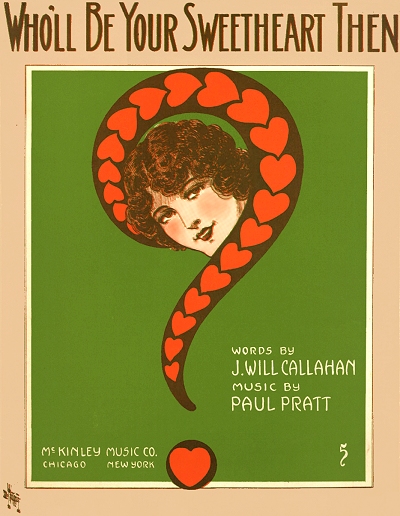 repoortedly taking on conducting duties from time to time. Pratt also worked with a few other prominent groups, including the Harry Archer Orchestra in 1925 and 1926, mostly as an arranger or conductor, but possibly as a pianist from now and then.
repoortedly taking on conducting duties from time to time. Pratt also worked with a few other prominent groups, including the Harry Archer Orchestra in 1925 and 1926, mostly as an arranger or conductor, but possibly as a pianist from now and then.
 repoortedly taking on conducting duties from time to time. Pratt also worked with a few other prominent groups, including the Harry Archer Orchestra in 1925 and 1926, mostly as an arranger or conductor, but possibly as a pianist from now and then.
repoortedly taking on conducting duties from time to time. Pratt also worked with a few other prominent groups, including the Harry Archer Orchestra in 1925 and 1926, mostly as an arranger or conductor, but possibly as a pianist from now and then.Pratt used the Parnell name on the 1930 census while still living in Manhattan, listed as a theater musician, and magically five years younger than previous records had indicated. The listing also showed him as still married, but Mary was evidently not staying with him in the hotel on West 44th Street when the poll was taken. As of April 10, Paul had not been working for 50 days, so it is probable that the Great Depression was settling in and he was one of the scores of musicians finding their talents and services no longer in demand.
Home seems to have called Paul in the early 1930s during the Depression, in part because musical work was hard to find with theaters shutting down in the East. So he returned to Indianapolis to lead a dance orchestra, Paul Parnell and the Sycamores, for two to three years. Even after more than two successful decades in the music business, his passion for photography led him to abandon the bandstand and open a studio in 1932 in Indianapolis, and lived either there or just outside of the city in Marion County, as indicated by various city directories. Photography became his profession of choice for his remaining years. His 1942 draft card showed simply that he owned his own business at 810 E. 63rd Street in Indianapolis. He was listed under photographers in several editions of the Polk's Marion County and Indianpolis City Directories. Mary disappeared from his life around 1942, but the circumstances were hard to locate. On March 12, 1943, Pratt was married a fourth time to Edythe Lee Willard, and the couple had a daughter, Sharon Gaye, within a year. Unfortunately Paul died of a coronary at the age of 58. Edythe survived him by several years.
While Paul Pratt's output may be considered small to average, the quality of each of his works should in no way be minimized. He was meticulous in his voicing as well as the creation memorable melodies. The poignant Teasing Rag is every bit as innovative as his virtuosic Hot House Rag, a favorite of some artists during the first ragtime revival, including Wally Rose and Red Nichols. But his efforts as an arranger also brought us the works of his peers in the best possible light, therefore expanding his musical legacy well beyond pieces with his own name on them.
Thanks go to Brian Penn, Grandson of Paul Pratt, who provided a little extra information on the Pratt family and Paul's career in
Article Copyright© by the author, Bill Edwards. Research notes and sources available on request at ragpiano.com - click on Bill's head.